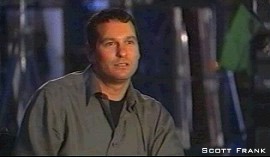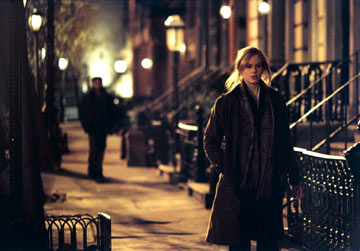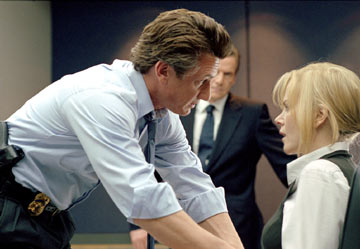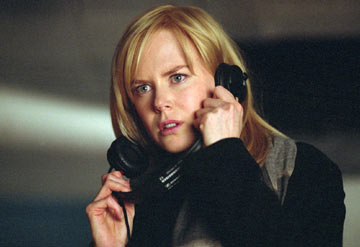
INTERPRETING Scott Frank
June 2nd, 2005
by CHRISTOPHER WEHNER

Scott Frank was born in Fort Walton Beach, Florida but the family moved to Los Gatos, California, where he graduated from college with a degree in film studies in 1982. He got his first start in the industry doing research for documentaries. His first writing efforts found their way to the screen quickly and early on his talent for creating dynamic characters and edgy drama shined through. His quirky teen comedy Plain Clothes (1988) was directed by Martha College. Then in 1991 Kenneth Branagh directed Scott's highly imaginative and romantic thriller, Dead Again, which was an ambitious and sophisticated effort. Frank displayed his versatility with his next effort, a screenplay he had written in college, which became Jodie Foster's directorial debut in 1991 called, Little Man Tate.
Last month, The Interpreter, his latest effort (he was a co-writer) hit theaters across the country and though he was a hired gun, the chance to work with Sydney Pollack again was something that Frank could not pass up. In The Interpreter, a U.N. interpreter Silvia Broome (Nicole Kidman) inadvertently overhears a death threat against an African head of state scheduled to address the United Nation'Â’s General Assembly. Realizing she'Â’s become a target of the assassins as well, Silvia is desperate to thwart the plot if she can survive long enough to get someone to believe her.
In this exclusive interview Scott Frank talks about how he got involved with The Interpreter, what'Â’s happening with his possible directorial debut this winter (The Lookout) and his adaptation of A Walk Among the Tombstones; as well as his creative process for adapting other writer'Â’s stories. Speaking with Scott Frank about some of his script doctoring work you always get the sense that he's a little embarrassed by it all. What he wants, like any other writer, is to see his own original story ideas on screen. Which is what he is bound and determined to do this coming winter with The Lookout.

Chris: Scott, how did you get involved with THE INTERPRETER?
Scott Frank: I came on to that in May of 2003 to do five weeks because I go away for the summer so I knew I only had until July. So I was just going to work for those few weeks. There was already an existing script that Charles Randolph had written. Sydney Pollack wanted to keep a lot of the conceptual elements but redo the story. So we began working and it was a pretty fun script that Charles had written, but it ended on a twist that we decided was really unworkable. So in order to redo the movie without the twist we had to rebuild the whole story. I worked for the five weeks and gave Sydney what I had, about 60 pages, and he kind of doodled on it over the summer and I came back in the fall and worked on it until about February the following year. I couldnÂÂ’t quite solve the ending. He had a version of the ending he liked very much and I didn'Â’t know how to make it work and really felt stuck. Sydney thought I was closer than I thought I was, but I just didnÂÂ’t believe it and couldn't write it. So I reluctantly left as I felt that I wasnÂÂ’t really helping at that point and Steven Zaillian came on.
Was this Charles Randolph'Â’s original script?
Well they gave him the idea. They said they wanted to make a movie about the U.N. (United Nations) and an interpreter. They tried a couple versions. His script was well written and I enjoyed it. But you couldnÂÂ’t do it because of the ending. The ending twist was essentially that she made everything up. Which you just couldn'Â’t do. Therefore she was just pretending to be afraid for two hours and we didnÂÂ’t believe any audience would accept that.
His original screenplay THE LIFE OF DAVID GALE had a similar type ending. Which was well done I thought.
Yes, but we didn'Â’t want to do a movie with a twist.
Do too many writers get caught up in making their stories more and more dynamic, M. Night Shyamalan for one, and as a result they get themselves into a dark corner as a writer.
Yes, if the twist ending is the centerpiece then you are. If you'Â’re writing simply to have a twist then you're in trouble. If the twist comes to you organically, then I think youÂÂ’re on much firmer ground.
When you'Â’re coming in as a hired gun to rewrite what is the mentality or the approach and how is it different than an original?
This wasn'Â’t really a rewrite in terms of strengthening character or polishing the story. I was really rebuilding a story. Even in that circumstance you're using a different part of your brain, more of the editorial part; you'Â’re also being creative especially in this instance. I was creating character and so on, but I wasn't beginning there. I was working backwards from an editorial perspective in a way.
When dealing with someone else'Â’s story how do you begin the creative process?
I'Â’ll outline sections of the script so that I understand everything about it. Because I have not written it I'Â’m not right away inside of it as much as I need to be so I may outline sections of it to get a good look at it, and see what I think is wrong or needs work.

If you get stuck is there a certain way you approach every story?
If I get stuck it means I haven'Â’t done my homework on the characters. I don'Â’t know enough about the people in my story to write about them. So I'm just trying to make things up. If I've created real people, they start to develop a life of their own and take over the story from me at some point. What is inconsistent or dishonest to the people IÂÂ’ve created sticks out. I also read a lot books that inspire me more than movies. If I'm stuck, I'Â’ll force myself to stop--—which is hard for me--—and pick up a book. Something that inspires or relaxes me. Something that makes me want to write and that gets the juices flowing. Something that'Â’s fun when you write, it's about play so you should have a good time now and then even though it's so damn hard.
When you adapt novels do you find your representations of the characters drift from the novel's during rewrites?
A novel is a separate “thing” from a script. Often times what makes a novel wonderful has nothing to do with what makes a good film (author's voice, setting, etc.) You have to decide what the book is about for you and write from there. That includes the characters. If they don't fit in with what you're trying to do, then you have to change them. You have to change anything that doesn't work into the story you are now trying to tell. If you simply try and translate a novel into cinema you end up with a trivialized version of the novel.
When you feel your story is dragging how do you develop it into a story that you'd enjoy seeing?
When my story is dragging I'm usually trying to say or explain too much at once, or in the wrong way. Often it's a structural thing like the wrong scene at the wrong time. Or I'Â’ve just gotten way off the point. ItÂÂ’s just a matter of going back and forth until I figure out what's wrong exactly and then get re-inspired to go on. I usually go back and start from the beginning, and see where it all stops. I begin every day by rewriting the work I did the day before just so I can recapture the rhythm.
With some criticism coming down on George Lucas with his supposed anti-Bush political message in his latest installment of STAR WARS, THE INTERPRETER seemed to avoid that. How does a film that deals with politics avoid making a stance?
Well I'Â’ll say this, you can'Â’t avoid politics just as much as you can'Â’t avoid the conclusions some will come to as to what it all means. You canÂÂ’t have the absence of a political message in a movie like this. I think the trick was not to have too much of a message and not to get preachy and make sure the movie had enough pulp. I think there is a lot of overreaction going on and that periodically happens. Eventually it will subside.

You'Â’ve been branching out into different genres lately, MINORITY REPORT was your first sci-fi, and you did a little work on a horror script, DAWN OF THE DEAD.
I did a rewrite for a few weeks on that. I had a blast actually. It was fun, I mainly just did a little script doctoring really. I loved the original and I loved the director [Zack Snyder] and the producer. They are really smart guys and it sounded like just too much fun to pass up. It was probably the most fun I have ever had on a rewrite.
Where does THE LOOKOUT stand, I know you had hope to start shooting that last year? You'Â’ll be making your directorial debut.
It'Â’s a winter shoot so we missed it this year. I couldn'Â’t cast it. It'Â’s very hard to find a lead. I had Ryan Gosling and then I lost him after a few months. I'Â’m going to put some people on tape this month, but I'Â’m really going to start looking hard in the fall and hopefully start prep late fall to shoot next winter. I have financing from Spyglass and distribution from Disney, so I'Â’m very hopeful that it will happen.
Any progress with A WALK AMONG THE TOMBSTONES?
I would love to see it get made. The problem is finding a movie star who is fifty years old and wants to do it. ItÂÂ’s very dark and itÂÂ’s very hard to get a studio behind it and put the money up for it. ItÂÂ’s a tough one.
Is the screenplay pretty much done?
Yeah it is. We just can'Â’t seem to find a studio that will get behind it and fund it. I believe someday it will get made.
You received credit on THE FLIGHT OF THE PHOENIX, last time we talked you didn'Â’t have much to do with it as they took the story in a completely different direction from what you had originally done.
There was a point where I thought about taking my name off it. After I saw the film in particular. It followed my story structurally, you know, to a large degree. But the characters and dialogue, none of that, was really mine. But I felt that it would have been an incredibly antagonistic thing to do to a studio that I harbored no ill will towards. I really got a long well with the people at Fox and they treated me very well, and I think if I had asked them to take my name off of it they would have, but it probably would have hurt them and my relationship with the studio. I thought long and hard about it and decided to just let it go.
How was your experience as an interviewer in A DECADE UNDER THE INFLUENCE?
A buddy of mine Richard LaGravenese asked if I would interview Sydney Pollack and Robert Towne, and I said, "are you kidding me?" ” I would love to do it. It was a blast. With Sydney you just turn the camera on and let him talk; he is truly one of the more interesting people to talk to. He really is able to articulate what was going on during that period. What was going on in both society and the movie industry and how they hinged together. Towne also had a keen insight into that period as well. He was right in the middle of it, so. He is fascinating to talk to because of his experiences with Warren Beatty and Jack Nicholson. I often times forgot I was supposed to be interviewing them.
More recent articles in Interviews
Only logged-in members can comment. You can log in or join today for free!
Advertisement






